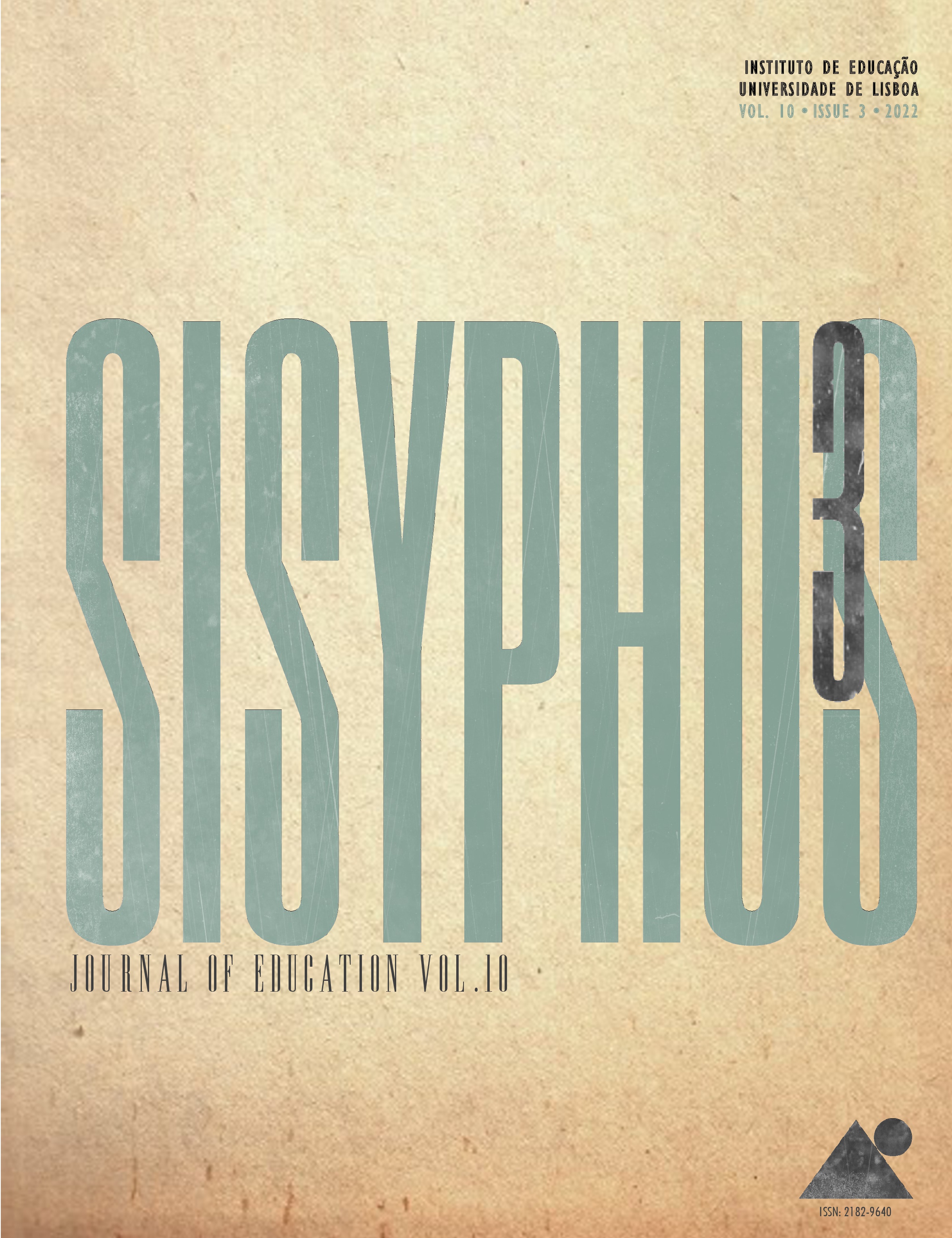Aspects of Continuing Education of Teachers Working in the Education of Persons with Intellectual Disabilities
DOI:
https://doi.org/10.25749/sis.27550Keywords:
teacher training, mathematics, intellectual disability, soroban, numbers and operationsAbstract
This study aims to analyze the process of continuing teacher education who work with people who have a diagnosis of intellectual disability, for the insertion of soroban as a calculation tool for these students. Based on the Historical-Cultural Theory, the study used collaborative research as a strategy. Held in the Midwest region of Paraná, Brazil, it involved the participation of nine teachers working in the education of people with intellectual disabilities in the city. The study shows: i) the precariousness of teacher training for teaching Mathematics; ii) the conception of the teachers participating in the research that students with this disability are less developed than other students and “slower” in learning and iii) the need of continuing education for teachers. At the end of the study, there was a consensus among the participating teachers that teaching based on students' abilities and the use of soroban as a mediating instrument promote the learning and development of mathematical concepts.
Downloads
References
Brasil / Ministério da Educação. (2007). Atendimento educacional especializado: formação continuada a distância de professores para atendimento educacional especializado para deficiência mental. (1ª Edição). Brasília: MEC/SEESP.
Brasil / Ministério da Educação (2009). Resolução 04 de 2009. (1ª Edição). Brasília: MEC/SEESP.
Donlan, C, & Wu, C. (2017). Procedural complexity underlies the efficiency advantage in abacus-based arithmetic development. Cognitive Development, (43), 14-24.
Flick, U. (2009). Introdução à pesquisa qualitativa. (3ª Edição). Porto Alegre: Artmed.
Freeman, N. (2014). Does the japanese abacus improve underachieving children’s performance in mathematics? Proceedings of the Britsh Society for Research into Learning Mathematics, 34(3), 13-18.
Galperin, P. Y. (2009a). Acerca del lenguage interno. In L. Q. Rojas & Y. Solovieva (Eds.), Las funciones psicológicas em el desarrollo del niño (pp. 91-97). México: Trillas.
Galperin, P. Y. (2009b). La dirección del proceso de aprendizaje. In L. Q. Rojas & Y. Solovieva (Eds.), Las funciones psicológicas em el desarrollo del niño (pp. 113-119). México: Trillas.
Galperin, P. Y. (2009c). La formación de las imágenes sensoriales y los conceptos. In L. Q. Rojas & Y. Solovieva (Eds.), Las funciones psicológicas em el desarrollo del niño (pp. 64-75). México: Trillas.
Galperin, P. Y. (2009d). La formación de los conceptos y las acciones mentales. In L. Q. Rojas & Y. Solovieva (Eds.), Las funciones psicológicas em el desarrollo del niño (pp. 80-90). México: Trillas.
Glat, R. (2000). Formação de educadores na perspectiva da inclusão. Revista Souza Marques, II(6), 16-23.
Hiebert, J., & Wearne, D. (2006). Developing understanding through problem solving. In H. L. Shoen (Ed.), Teaching mathematics through problem solving: grades 6-12 (pp. 3-14). United States: National Council of Teachers of Mathematics.
Ibiapina, I. M. L. de M. (2007). Formação de professores: texto & contexto. Belo Horizonte: Autêntica.
Ibiapina, I. M. L. de M. & Ferreira, M. S. (2007) A trama de pesquisar e formar em colaboração. In I. M. L. de M. Ibiapina, Formação de professores: texto & contexto (pp. 15-34). Belo Horizonte: Autêntica.
Lacanallo, L. F., Albuquerque, R. A., & Mori, N. N. R. (2010). A ação docente e o ensino de conceitos matemáticos: algumas reflexões numa perspectiva histórico cultural. In N. N. R. Mori & A. M. P. L. Goulart (Eds.), Educação e inclusão: estudos sobre as salas de recursos no estado do Paraná (pp. 83-95). Maringá: Eduem.
Leontiev, A. N. (2012). Os princípios psicológicos da brincadeira escolar. In L. S. Vigotski, A. R. Luria & A. N. Leontiev (Eds.), Linguagem, desenvolvimento e aprendizagem (pp. 119-142). São Paulo: Ícone.
Mahpop, H., & Sivasubramaniam, P. (2010). Addition of whole numbers with regrouping using the soroban. Procedia Social and Behavioral Sciences, 8, 50-56.
Mamcasz-Viginheski, L. V. M. (2017). O soroban na formação de conceitos matemáticos por pessoas com deficiência intelectual: implicações na aprendizagem e no desenvolvimento. (Tese de Doutorado em Ensino de Ciência e Tecnologia). Programa de Pós-Graduação Em Ensino de Ciência e Tecnologia, Universidade Tecnológica Federal do Paraná, Ponta Grossa, Brasil.
Peixoto, J. L. B., & Santana, E. R. S. (2009). Soroban: uma ferramenta para a compreensão das quatro operações e a inclusão de alunos com dificuldades de aprendizagem. Escritos Pedagógicos, 4(1/2), 97-118.
Saviani, D. (2009). Formação de professores: aspectos históricos e teóricos do problema no contexto brasileiro. Revista Brasileira de Educação, 14(40 jan./abr), 143-155.
Shen, H. (2006). Teaching mental abacus calculation to students with mental retardation. The Journal of the International Association of Special Education, 7(1), 56-66.
Shimazaki, E. M., & Pacheco, E. R. (2012). Deficiência e inclusão escolar. (2ª Edição). Maringá: Eduem.
Talizina, N. (2009). La teoría de la actividad aplicada a la enseñanza. (4ª Edição). Puebla: Martins Fontes.
Vygotsky, L. S. (1997). Fundamentos da defectologia. Obras Escogidas 5. (4ª Edição). Madrid: Visor.
Vygotsky, L. S. (1998). A formação social da mente. (4ª Edição). São Paulo: Martins Fontes.
Downloads
Published
Issue
Section
License
Copyright (c) 2022 Sisyphus — Journal of Education

This work is licensed under a Creative Commons Attribution-NonCommercial 4.0 International License.
Copyright (c) belongs to Sisyphus - Journal of Education. However, we encourage issued articles to be published elsewhere, provided that Sisyphus authorization is asked for and that authors integrate our original source citation and a link to our website.
Author Self-Archiving Policy
Author(s) are permitted to self-archive the final published version in institutional or thematic repositories, and in their personal or institutional websites.
DORA Signer
The Instituto de Educação da Universidade de Lisboa, Sisyphus' Publisher, is a San Francisco Declaration on Research Assessment signer.






